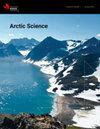Surface-based temperature inversion characteristics and impact on surface air temperatures in northwestern Canada from radiosonde data between 1990 and 2016
IF 3.2
3区 地球科学
Q2 ECOLOGY
引用次数: 3
Abstract
Assumptions of linear lapse rates in regions prone to surface-based inversions can generate biases in the prediction of surface air temperature. Although studies of Arctic inversions are common, few regional studies of their characteristics exist in high-latitude regions with mountainous topography. To address this gap, vertical atmospheric temperature profiles for five sites in northwestern Canada were analysed using archived radiosonde data from 1990-2016. We present monthly, seasonal, and annual SBI characteristics including the occurrence of transient and persistent SBIs. A novel metric, surface-based inversion impact (SBIimp), was developed by combining the traditional inversion characteristics of depth, strength, and frequency, and was used to quantify the impact of surface-based inversions on cooling the surface-air temperature. SBIimp values of > 5°C yr-1 and ~ 10°C winter-1 occur locally. A weak linear relationship between sea ice coverage in the Beaufort Sea and SBIimp manifests across parts of the study area, though this relationship does not persist after detrending the datasets. Topographic analysis of areas surrounding each radiosonde location reveal highly variable SBIimp in complex mountain areas and more consistent SBIimp across areas of low relief. Our results can help interpret the role of inversions in climatic conditions maintaining cryospheric elements such as permafrost.根据1990年至2016年的探空仪数据,加拿大西北部基于地表的温度反演特征及其对地表气温的影响
在容易发生地表逆温的地区,对线性递减率的假设会对地表气温的预测产生偏差。虽然对北极逆温的研究很普遍,但在高纬度山地地区对其特征的区域性研究很少。为了解决这一差距,研究人员利用1990年至2016年的无线电探空仪存档数据,分析了加拿大西北部五个地点的垂直大气温度曲线。我们提出了月度、季节性和年度SBI特征,包括短暂性和持续性SBI的发生。结合深度、强度和频率等传统反演特征,提出了一种新的测量方法——基于地表的反演影响(shiimp),用于量化基于地表的反演对冷却地表空气温度的影响。年-1和冬季-1的shiimp值为~ 10°C。波弗特海的海冰覆盖与shipp之间存在微弱的线性关系,这种关系在数据集去趋势化后并不持续。对每个探空仪位置周围区域的地形分析表明,在复杂山区,shipimp变化很大,而在低起伏地区,shipimp更加一致。我们的结果可以帮助解释逆温在维持冰冻圈元素(如永久冻土)的气候条件中的作用。
本文章由计算机程序翻译,如有差异,请以英文原文为准。
求助全文
约1分钟内获得全文
求助全文
来源期刊

Arctic Science
Agricultural and Biological Sciences-General Agricultural and Biological Sciences
CiteScore
5.00
自引率
12.10%
发文量
81
期刊介绍:
Arctic Science is an interdisciplinary journal that publishes original peer-reviewed research from all areas of natural science and applied science & engineering related to northern Polar Regions. The focus on basic and applied science includes the traditional knowledge and observations of the indigenous peoples of the region as well as cutting-edge developments in biological, chemical, physical and engineering science in all northern environments. Reports on interdisciplinary research are encouraged. Special issues and sections dealing with important issues in northern polar science are also considered.
 求助内容:
求助内容: 应助结果提醒方式:
应助结果提醒方式:


